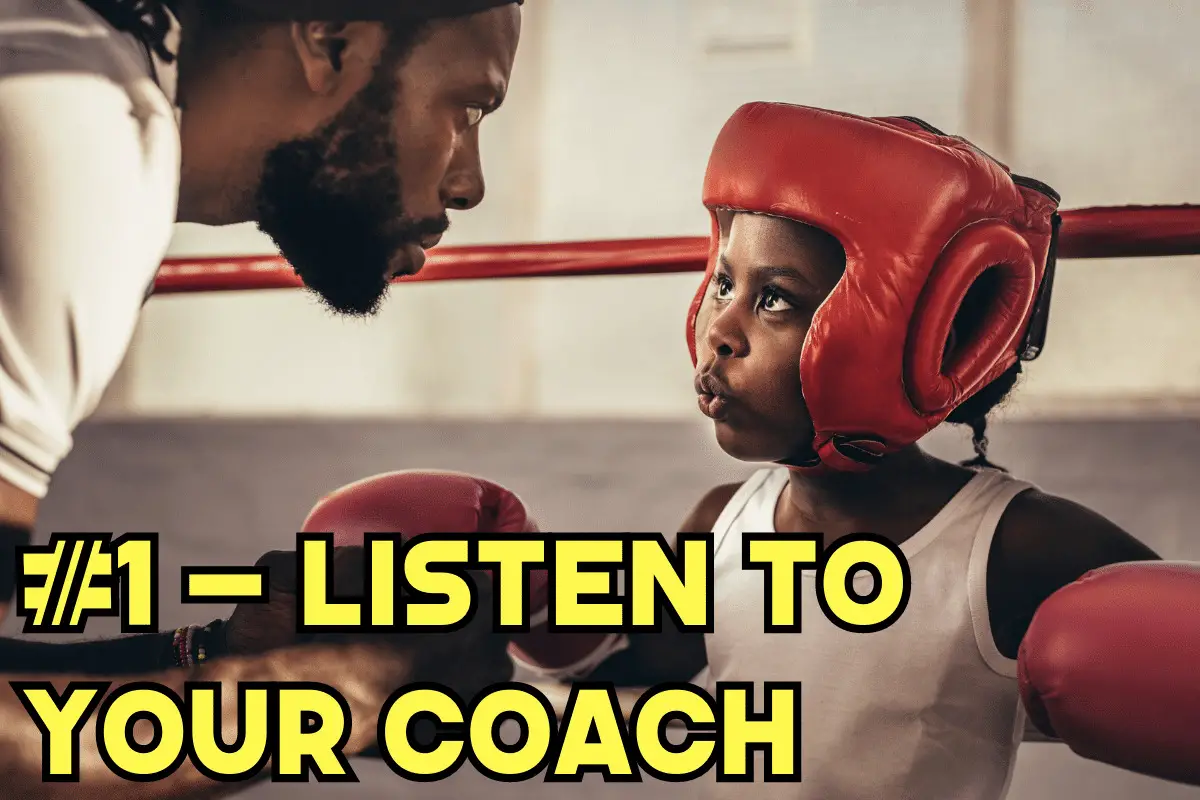Are you eager to step into the ring and conquer your first Muay Thai competition? The world of combat sports offers an exhilarating path of self-discovery and achievement, and your debut in Muay Thai is an incredible milestone. As you embark on this thrilling journey, arming yourself with the right knowledge and preparation can make all the difference between victory and defeat.
I know how scary a real fight and competition can be. You’re most likely scared to lose and get knocked out. What we’ll learn today is what to think, what not to think, and how to prepare so you’re not feeling scared and are eager to step into the ring and win.
If you implement the tips in this article, you’ll be able to step in the ring with a visual image of you winning, which will help you fight harder. Not only will you be more likely to win the fight itself, but you’ll also minimize fear and ensure flawless preparation.
I’ve been there. We’ll all be there. The feeling of stepping into the ring can be the most daunting thing you do in your entire life. Nonetheless, by following and implementing the tips I’ll present to you in this article—you’ll amp up your winning chances.
Without further ado, let’s dive into the first tip to win your first Muay Thai fight!
#1 – Listen to Your Coach
The first tip is to be coachable. So why should you even have a coach? The straightforward answer to that is that you wouldn’t have learned piano without a piano instructor. While definitely possible, it would take much longer to do so.
Your coach is an essential part of your preparation. They will provide valuable insights, feedback, and game plans to improve your chances of winning. Be open to their guidance and trust their experience.

Your coach will give you an outside view of the fight. An excellent coach will also boost your mindfulness and focus during a fight, as you’ll feel more confident in your abilities as a fighter.
When you have a good team who all got your back, you’ll be much more confident and capable of achieving more results. At last, you’ll fight more aggressively with a solid coach, as you’ll know you’re capable of beating your opponent, which will reassure you of your abilities and winning chances!
#2 – Visualize Winning the Fight
Visualization is a scientifically-proven tool to achieve more results in anything in life. If you’re constantly thinking about improving your Jab, for instance, you’ll naturally be eager to work on it. As a result, it’ll improve.
However, that’s not the real magic that visualization will give you. What proper visualization does is improve your physical skills without physical practice. I don’t know if you understand how amazing it is and how much of an advantage you can gain if you use this tool.
Winning in Muay Thai requires mental toughness and focus. Visualize yourself performing well and winning the competition. Work on managing your nerves and emotions, as this will impact your performance in the ring. This is how you use visualization to reduce fear and maximize winning your winning chances.
But, you also want to sparkle your fighting technique with magic. How do you do that? By visualizing the points you want to improve (preferably weaknesses.) If your Hooks are weak because you’re not incorporating your hips enough, you want to visualize yourself executing the Hook many times with your hips.
You want to see that in your mind. And that is how you use visualization to reduce fear of fighting and improve your actual fighting technique without physical practice. That’s such a powerful and underrated tool you want to utilize.

Visualization stimulates brain regions involved in movement rehearsal, priming the brain and body for action and, like physical practice, functions as training to improve real-life performance.
SOURCE
#3 – Spar and Simulate Fights
People underestimate the amount of fear and pressure you will feel in your typical Muay Thai training session. If you train in a solid fighting gym, you’ll feel tons of pressure all the time. You’ll fight and spar with people you’ve never fought before, which will make you feel anxious.
Feeling this anxiety, pressure, and fear is exactly what you want to do. You must force yourself to do these activities because it’ll then make your real fight, whether it’s a competition or a street fight, seem much less daunting.
Regularly engage in sparring sessions and simulated fights to gain experience in a controlled environment. This will help you get used to the intensity and pressure of real competition and sharpen your skills.
And with time, you’ll feel less and less pressure before every spar. This will translate to your real fight or competition, which is what you want to achieve.
So spar regularly and appreciate the anxiety and pressure, as that precisely is what builds fearsome fighters!
#4 – Master the Basics
The next tip is to focus on and master the basics of Muay Thai. Many of you might think now: “Well, that’s obvious.” However, I would argue that it’s one of the least used ways that’ll make you a much better fighter who knows to control his technique and his emotions.
While fancy techniques can be impressive, mastering the basics is crucial. A solid foundation of fundamental techniques will serve as a strong base during the competition. Focus on refining your technique and footwork to improve your overall performance.
If you can throw a 2% stronger Overhand Punch by practicing it for 15 minutes straight, you’ll be more likely to win the competition and fight you’re about to attend. However, if you practice for 15 minutes and only focus on complicated movements and techniques that won’t benefit you as much, you won’t get any closer to winning your first fight.
Your fighting skills can be represented by a building. If your foundation is narrow, the entire building will crash once you go up a certain floor. However, if your foundation is the widest part, it’ll be easier to build on top of it and get to higher floors.
So mastering the basics will allow you to progress further in your Muay Thai training. While I’m not advocating focusing on complicated movements, I’m suggesting you first build your foundation and keep widening it even after you think you’ve learned everything. That way, you’ll be able to get into more complicated movements and master them with ease, such as learning advanced Clinching techniques.
#5 – Study Your Opponent
The 5th tip is to study your opponent. This won’t be possible if you’re about to get into a random street fight. However, if your first fight is in a competition where you know which fighter you’ll be facing, you want to gather information regarding their style.
If possible, gather information about your opponent’s fighting style, strengths, and weaknesses. Understanding your opponent’s tendencies can give you a strategic advantage during the bout.
You can also plan according to your findings. If you see that your opponent loves to bait the counter Cross, you now understand that you don’t want to invest too much and end up getting a mean Cross to the face.
So studying your opponent isn’t enough. Instead, you want to plan your fighting style according to his weaknesses, strengths, and common techniques.

#6 – Focus on Conditioning
One of the most common mistakes Muay Thai fighters make is only work on their fighting techniques. However, that’s a huge mistake because physical conditioning can be as important as your fighting skills.
Muay Thai fights can be physically demanding. Incorporate strength and conditioning exercises into your training routine to increase your endurance and overall fitness. This includes cardiovascular workouts, strength training, and flexibility
That’s why you see jacked fighters who are also muscular. All fighters who are serious about their fighting skills invest time and effort into strength and conditioning training. That means they also go for runs and lift weights in the gym.
So make sure to incorporate strength, aerobic, and conditioning routines in your training schedule.

#7 – Train Hard
90% of fighters reading this article aren’t working as hard as they think they are. If you currently think you’re at the limit of your training potential, you don’t know what your body is truly capable of. We’re machines and we need to train our minds and our bodies all the time. However, I’m confident that under 1% of the population is actually working exceptionally hard. And these people will experience the most results.
Consistent training is the foundation of success in any combat sport. Attend all your training sessions and work on improving your technique, stamina, and strength. Practice the fundamental Muay Thai techniques such as punches, kicks, knees, and elbows to build a solid skill set.
I don’t want to lower your confidence by telling you that you’re not working hard enough. In fact, the opposite is true. I want you to get angry at the fact that you’re not currently at your potential, because I’m sure you’re not.
So while overtraining is a possibility you must avoid at all costs, you can train harder at your current sessions. You don’t have to train on your day off, this is not what I meant. What I mean is that you can train much harder at what you currently are doing.
If you’re going for a run, push yourself further this time. You’ll all of a sudden see you’re capable of running faster, although you didn’t think it was possible beforehand.
Make sure to train as hard as you can while avoiding overtraining and resting sufficiently. Your body needs time to recover, as it’ll serve you better if you let it have it.
When should you do your first Muay Thai fight?
Now that you can implement the tips to win your first fight, let’s review how to know if you’re ready or not. I’ll now list various factors that you want to consider to ensure you’re ready for your first Muay Thai fight. Here they are!
- Basic Technique Proficiency: Before considering a fight, ensure you have a solid understanding of the fundamental Muay Thai techniques. You should be comfortable with punches, kicks, knees, and elbows, as well as basic defensive maneuvers and footwork.
- Training Experience: You should have spent a considerable amount of time training and sparring in a controlled environment. Regular sparring sessions with training partners can help you gain confidence and adapt to the intensity of a fight.
- Physical Conditioning: Muay Thai fights can be physically demanding, often lasting multiple rounds. Ensure you have good cardiovascular endurance, strength, and flexibility to withstand the rigors of a real bout.
- Mental Preparedness: Being mentally ready for a fight is crucial. You need to be able to handle the pressure, nerves, and stress that come with competing. Confidence in your abilities and mental resilience are essential for success.
- Support from Coaches: Your trainers and coaches play a crucial role in determining your readiness for a fight. They will have the experience and knowledge to assess your skills and provide guidance on when you are ready to compete.
- Health and Injury Status: Ensure you are in good health and free from any significant injuries before considering a fight. Fighting while injured can exacerbate the problem and hinder your performance.
- Age and Experience Level: Younger fighters or those with less experience may prefer to gain more training and ring experience before stepping into a competitive environment.
Final Words
As we conclude this journey through the essential tips to win your first Muay Thai competition, remember that success in the ring is not solely defined by victory. Each step you take, every punch you throw, and every kick you land is a testament to your dedication and passion for this ancient art form.
This is the only thing that matters; self-improvement and self-discovery are the primary goals and root purposes of Muay Thai. Although winning is important, it’s not the most important thing to focus on.
Indeed, each punch you throw, each kick you land, and each time you step into your Muay Thai gym are a show of your character. The amount of dedication, effort, tears, and blood you invest into your training is going to equal the number of results you experience.
If you’re interested in learning more about Muay Thai and a complete beginner’s guide to learning it the right way, follow this link.
Here are other articles you’d enjoy reading:

